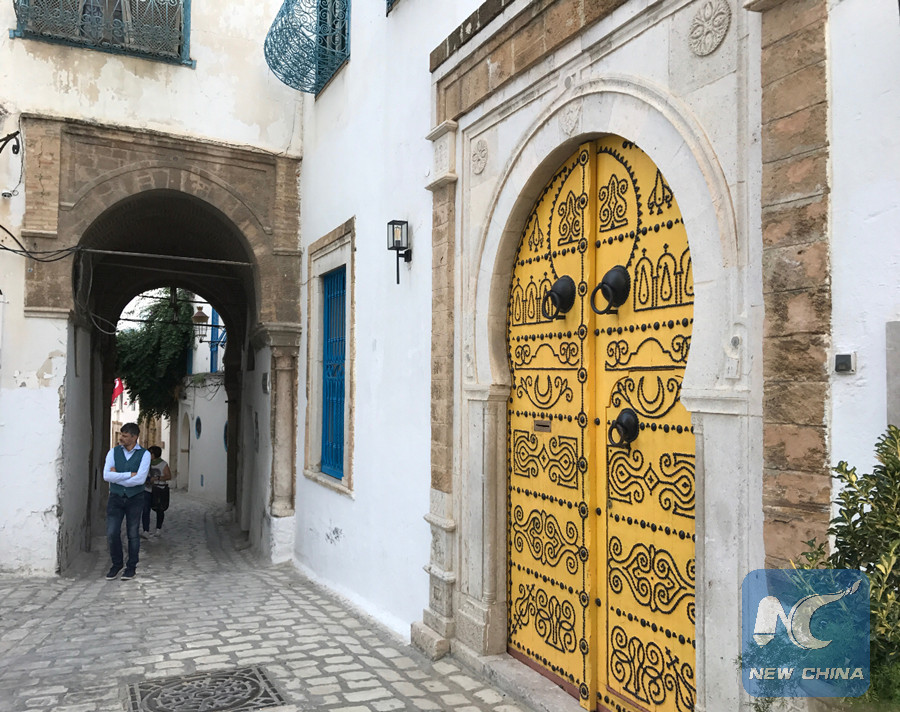
Various dishes with Mediterranean, Arabic and North African flavors are provided at a local restaurant in the Medina of Tunis, capital of Tunisia on Oct. 27. (Xinhua photo)
TUNIS, Oct. 27 (Xinhua) -- A three-meter-high arched chrome yellow door studded with metal studs motifs is the entrance to a restaurant located in the Medina of Tunis, a UNESCO World Heritage Site since 1979.
A Chinese family of three were sitting in the Arabian-palace-decorated dining hall, looking through the menu.
"The food here mixes Mediterranean, Arabic with North African flavors, delicious and exotic," said Feng Shuo, a 45-year-old engineer from southwestern China's Chongqing Municipality.
The Chinese family already finished a five-day self driving tour in Tunisia. Wang Xiaofei, Feng's wife, said "besides the food, we are also amazed by the archeological sites, beaches and deserts."
With a history of over 3,000 years, Tunisia is renowned for its rich tourism resources, lying at the north point of the African continent, bordering the Mediterranean Sea.
"Although the blur of French and Arabic language here is a little bit tricky for us who speak English, we embrace our adventure," laughed Wang, "Tunisia features its variety, which exceeds our expectations."

Photo taken on Oct. 27 shows a local restaurant in the Medina of Tunis, capital of Tunisia. (Xinhua photo)
Tunisia has become an increasingly popular destination for Chinese tourists. As of Oct. 20, a total number of 21,873 Chinese tourists have visited Tunisia in 2018, with a significant growth of 43.3 percent year on year, according to the data released by Tunisian government.
Tunisian Minister of Tourism and Handicrafts Salma Elloumi Rekik said Tunisia attaches great importance to China's tourists market and hopes to strengthen tourism cooperation with China.
"We are trying to draw more Chinese tourists, by upgrading payment methods, setting up Chinese logos, launching direct flights, as well as running Chinese restaurants, to make Chinese visitors' trips in Tunisia more convenient and enjoyable," said Rekik.
Wang Wenbin, Chinese ambassador to Tunisia, pointed out that tourism is one of the prioritized sectors of cooperation between China and Tunisia.
"The bilateral tourism collaboration has been promoted in recent years," said Wang. "For further strengthening tourism cooperation, we would like to work together with Tunisia in diverse forms, such as holding tourism forums and cooperative film and TV programs."
In 2017, Tunisia began to offer visa-free entry to Chinese tourists and the number of Chinese tourists rocketed to around 20,000 last year, 12,000 more than 2016. China has become one of Tunisia's fastest-growing tourism markets.
Karim Jatlaoui, representative of Tunisian National Tourism Office Beijing Bureau, expected Chinese tourists to increase to 50,000 by 2020.
Tunisia witnessed a slump in its tourism since 2015 when three major terrorist attacks claimed the lives of more than 70 people, mostly foreign tourists and security forces. Accounting for about eight percent of the country's GDP, tourism sector started to revive in 2017.
Earlier this year, Rekik pointed out that Chinese market would be a significant segment to revive Tunisian tourism industry.
According to the United Nations World Tourism Organization, China is considered as the world's fastest growing tourism market.
In this year's China week-long National Day holiday in October, Chinese travelers have traveled to over 100 countries and Tunisia ranked as one of the top ten outbound destinations for Chinese tourists, with a 50 percent year-on-year growth, according to the data from online travel agency Ctrip.
"Tunisia values cooperation with China in tourism and looks forward to a higher level of cooperation," emphasized Dhia Khaled, Tunisian ambassador to China.

